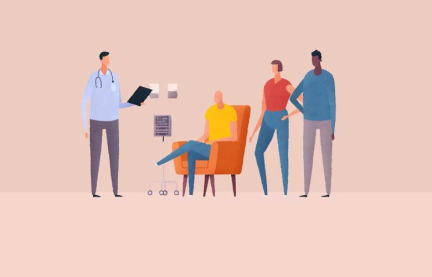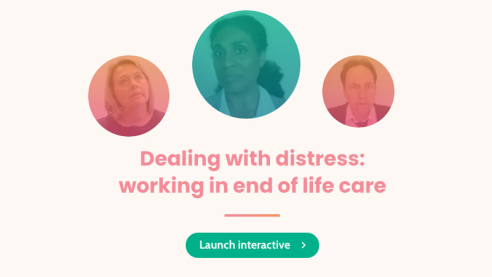
The word thanatology is derived from the Greek word ‘thanatos’ which means death. Broadly speaking, thanatology is the study of death and the events around it from different perspectives. This includes studies about the physical, ethical, medical, spiritual, sociological and psychological elements of death as well as interdisciplinary studies about how dying and death are managed and how people grieve, including the use of rituals.
Open Thanatology is the Open University’s interdisciplinary research group for the study and education of death, dying, loss and grief across the life course. Formally renamed in 2020, the group builds on the long-standing death and dying research group at the university with a renewed energy to promote these fields of research and education. This OpenLearn page provides examples of the education we have created based on our research and flag-ship modules here at the Open University, as well as our collaborations with other academics, professional organisations, and charities.
Check out the Open Thanatology hub
-
Centre for Open Thanatology Hub
Learn more to access more details of Centre for Open Thanatology HubCheck out the FREE content from Open Thanatology, The Open University’s interdisciplinary research group for the study and education of death, dying, loss and grief.

Collection
Death and Dying Matters
-
Beyond belief: talking to the dead
Take part now to access more details of Beyond belief: talking to the deadAre paranormal experiences real? Can being 'spiritual' help with the way you feel about death, dying and grief? This film interactive delves into spiritual healing and your views on life after death...

-
Coronavirus: Dealing with Death, Dying and Grief
Read now to access more details of Coronavirus: Dealing with Death, Dying and GriefThe coronavirus pandemic has lead to many people across the globe facing bereavement and grief. We've pulled together some FREE resources to offer advice or comfort in these times.

-
Life or Death Decisions
Take part now to access more details of Life or Death DecisionsEver heard of advance care planning? Setting out what you’d want to happen to you if you became too unwell to make your own decisions doesn’t have to be morbid but can be incredibly helpful and give you peace of mind. Find out more in this interactive video simulation…

-
An introduction to death, dying and grief
Learn more to access more details of An introduction to death, dying and griefExplore interesting and challenging ideas around death, dying and grief. This free course, An introduction to death, dying and grief, invites you to think more deeply about death and dying and encourages you to think about it in different ways. This course will introduce you to different perspectives on death; ethical issues related to dying and...

-
Death is inevitable: But do you need to plan for it?
Read now to access more details of Death is inevitable: But do you need to plan for it?For many, this question may at first seem like an odd one. It may be something you have never thought about – thinking about what the end of life may be like. For others, dying may not seem like something you can ‘plan for’, preferring to presume it is down to fate. And you might be wondering why question something you might have very little ...

-
Let’s not talk about dying: Five reasons why people avoid planning for their end-of-life care
Read now to access more details of Let’s not talk about dying: Five reasons why people avoid planning for their end-of-life careMost people haven't heard of advance care plans or may avoid planning for end-of-life care. Dr Erica Borgstrom tells us why...

-
Life After Death
Watch now to access more details of Life After DeathSuzanne Newcombe discusses what happens to us after we die in this short video..

-
Breaking Bad News
Watch now to access more details of Breaking Bad NewsHow do you tell someone that they're dying? And how will they respond to the news? This series explores different ways of breaking bad news and looks at the impact of how the news is delivered has upon the person hearing it.

-
Not intervening as a form of care
Watch now to access more details of Not intervening as a form of careLearning from palliative and end of life care.

-
Could you work in end of life care?
Take part now to access more details of Could you work in end of life care?Have you ever wondered what it's like to work in end of life care as a health care professional supporting dying patients and their families? Working with people who are dying can be both rewarding and emotionally draining.

-
Dying: what’s wellbeing got to do with it?
Read now to access more details of Dying: what’s wellbeing got to do with it?The concept of wellbeing is intended to be holistic and cover the entire life course and life events. However, when it comes to dying, wellbeing is usually not the first (or in top ten even) of words that people think about. People may be more familiar with thinking about ‘quality of life’, which if often linked to patient outcomes. In this ...

-
Terminal illness and wellbeing: supporting people in the workplace
Read now to access more details of Terminal illness and wellbeing: supporting people in the workplaceIt is well established that work impacts on people’s wellbeing. People often presume and create a separation between their work life and their private life. However, life events like having a terminal diagnosis, which may be considered private, can impact a person’s work. In this article, we provide several tips for supporting people with a ...


Rate and Review
Rate this article
Review this article
Log into OpenLearn to leave reviews and join in the conversation.
Article reviews
I like the You tube video about death aroun the world.
Good skill, well explained and friendly.
thank's